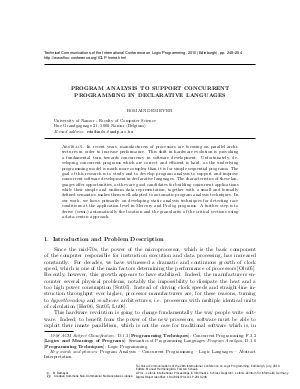Program Analysis to Support Concurrent Programming in Declarative Languages
Author Romain Demeyer
-
Part of:
Volume:
Technical Communications of the 26th International Conference on Logic Programming (ICLP 2010)
Part of: Series: Leibniz International Proceedings in Informatics (LIPIcs)
Part of: Conference: International Conference on Logic Programming (ICLP) - License:
 Creative Commons Attribution-NonCommercial-NoDerivs 3.0 Unported license
Creative Commons Attribution-NonCommercial-NoDerivs 3.0 Unported license
- Publication Date: 2010-06-25
File

PDF
LIPIcs.ICLP.2010.248.pdf
- Filesize: 116 kB
- 7 pages
Document Identifiers
Subject Classification
Keywords
- Program Analysis -- Concurrent Programming -- Logic Languages -- Abstract Interpretation
Metrics
- Access Statistics
-
Total Accesses (updated on a weekly basis)
0PDF Downloads0Metadata Views
Abstract
In recent years, manufacturers of processors are focusing on parallel architectures in order to increase performance. This shift in hardware evolution is provoking a fundamental turn towards concurrency in software development. Unfortunately, developing concurrent programs which are correct and efficient is hard, as the underlying programming model is much more complex than it is for simple sequential programs. The goal of this research is to study and to develop program analysis to support and improve concurrent software development in declarative languages. The characteristics of these languages offer opportunities, as they are good candidates for building concurrent applications while their simple and uniform data representation, together with a small and formally defined semantics makes them well-adapted to automatic program analysis techniques. In our work, we focus primarily on developing static analysis techniques for detecting race conditions at the application level in Mercury and Prolog programs. A further step is to derive (semi-) automatically the location and the granularity of the critical sections using a data-centric approach.
Cite As Get BibTex
Romain Demeyer. Program Analysis to Support Concurrent Programming in Declarative Languages. In Technical Communications of the 26th International Conference on Logic Programming. Leibniz International Proceedings in Informatics (LIPIcs), Volume 7, pp. 248-254, Schloss Dagstuhl – Leibniz-Zentrum für Informatik (2010)
https://doi.org/10.4230/LIPIcs.ICLP.2010.248
BibTex
@InProceedings{demeyer:LIPIcs.ICLP.2010.248,
author = {Demeyer, Romain},
title = {{Program Analysis to Support Concurrent Programming in Declarative Languages}},
booktitle = {Technical Communications of the 26th International Conference on Logic Programming},
pages = {248--254},
series = {Leibniz International Proceedings in Informatics (LIPIcs)},
ISBN = {978-3-939897-17-0},
ISSN = {1868-8969},
year = {2010},
volume = {7},
editor = {Hermenegildo, Manuel and Schaub, Torsten},
publisher = {Schloss Dagstuhl -- Leibniz-Zentrum f{\"u}r Informatik},
address = {Dagstuhl, Germany},
URL = {https://drops.dagstuhl.de/entities/document/10.4230/LIPIcs.ICLP.2010.248},
URN = {urn:nbn:de:0030-drops-26041},
doi = {10.4230/LIPIcs.ICLP.2010.248},
annote = {Keywords: Program Analysis -- Concurrent Programming -- Logic Languages -- Abstract Interpretation}
}
